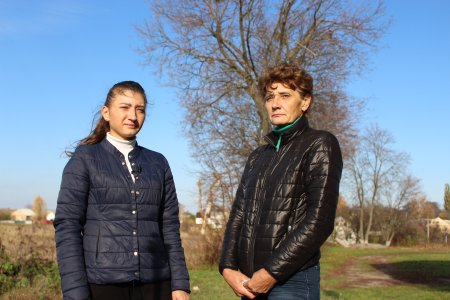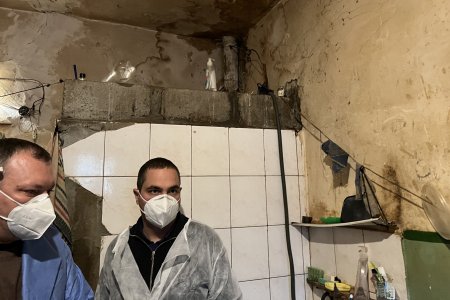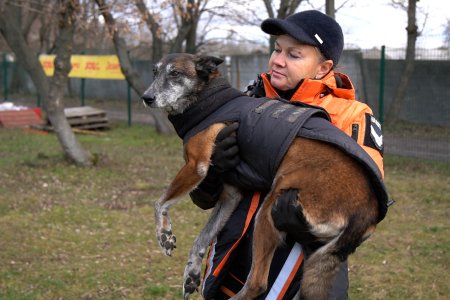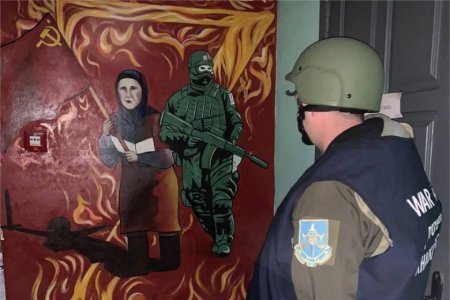![Віталій Чернов, директор Борівської школи © Оксана Комарова [Куп’янськ катівня ІВС] Vitalii Chernov, School Principal of Borivska School © Oksana Komarova Виталий Чернов, директор Боровской школы © Оксана Комарова](https://khpg.org/files/img/1608814880.jpg)
The Russians occupied the village of Borivske (Kupiansk District, Kharkiv Region) in the very first days of the full-scale war. The locals recall how every night enemy aircraft flew over their houses, and the glow of bombardment rose from the direction of Balakliia and Izium (towns in Kharkiv Region). At first, however, the situation in the village was calm: volunteers brought humanitarian aid, children studied remotely, the village council worked. Even the Ukrainian flag hung at the entrance to the village council.
— The Russian troops just passed through our village, — recalls Vitalii Chernov, the local school principal. — There was a village near us called Voloska Balakliia. And it seems that the Russian troops thought it was Balakliia (a town in Kharkiv Region). So, they drove in the direction of Voloska Balakliia. And when they realised, they were wrong, they turned back and drove through the village of Semenivka towards the town.
First, the Russians checked all the local hunters and collected their weapons. Interesting to mention that they already had lists of people whom they wanted to check. It was clear that someone among the locals had given them the information. Some people were listed not only by surname, but also by nickname. It turned out that there were people among us who were waiting for the Russians.
There was a village near us called Voloska Balakliia. And it seems that the Russian troops thought it was Balakliia. So, they drove in that direction.
In June, a new “chairman” of the village council appeared. It turned out that one of the locals had expressed a desire to cooperate with the Russians. He went to the former head of the village council to get the keys to her office. She refused to give him anything. Then either Russian military police or Russian soldiers came and forced her to give the new “chairman” the keys. But she had managed to hide all the important documents and seals before they came. From that moment on, the Russians were officially in power in the village. Then the Chechens came and tore down our flag. But they never put up the Russian flag.
“I will not work in a Russian school”
Throughout the spring, the school worked remotely according to the Ukrainian programme: teachers entered grades in electronic journals, and teachers who had left the village worked remotely. At the end of May, the school principles of all the schools in the area were invited to a meeting in Shevchenkove (a village in Kharkiv Region).
— Representatives of the so-called “Kupiansk district education department”, as they introduced themselves, came in, — Vitalii recalls. — They said that all educational institutions must come under the jurisdiction of the Russian Federation. They also said that there would be only Russian educational programmes and that learning would be done only in Russian. And they ordered us to submit lists of those who would agree to work. I immediately told our head of department that I would not agree to work and would probably leave the village.
But the principal’s family stayed in Borivske throughout the summer: everyone was hoping for a Ukrainian counter-offensive and early liberation. After all, the Ukrainian troops were not far from Shevchenkove. But as a new school year approached, the pressure on the school principal grew.
— The “chairman” came to me and urged me to work in the school. I said: “I won’t work. And there are no teachers in our school who have expressed a desire to work under the new rules”. Even before that I had told my staff: “Well, it is up to you to decide whether to work or not. If you want to work in a Russian school, that is your decision. But remember that we have a law on war collaborators. Teachers who express a desire to work will be considered “collaborators"”. The “chairman” came to see me several times. I tried to get off the hook, saying that I was done with education and was going to retire. Meanwhile, I was preparing to leave the village.
At that time there were only several ways to leave the occupied Kharkiv Region. So, Vitalii decided to leave with his wife, his child, his wife’s sister, his nephew and the nephew’s friend.
— The problem was that my nephew and his friend were both eighteen years old and the Russians would not let them leave. We couldn’t go either through the Baltic States because their foreign passports had expired.
At first, Vitalii tried to make a deal with someone in Shevchenkove who would help them to leave. But the trip kept getting postponed.
— Suddenly, my wife’s nephew was arrested by the Russians. He was accused of allegedly filming Russian equipment and passing the information on to our troops. We could not understand what they could find, because we were already preparing to leave and our mobile phones were clean. But they (the Russian troops) found a caricature of a Russian soldier with the letter “Z” on his mobile phone. This image had been stored on his phone since before the war. Where did it come from? The boys were playing an online game and were sending funny pictures to each other for fun. But the Russians decided that the nephew didn’t respect Russia and detained him for a week. Then they let him go. He said he was not beaten seriously, but he was hit several times with a truncheon.
Later, Vitalii made a deal with another person from Kupiansk. This man knew how to get through the Baltic States with expired passports. But the school principal did not have a chance to leave anymore. The Russian troops came for him.
“If you take that bag off your head, I’ll kill you!”
— The door opened and the first person I saw was my fifteen-year-old son, followed by six men with assault rifles. They pinned me face down on the floor. “Former school principal?” “Yes...” “Where are the school records?” “Everything is in the school, I didn’t take anything. You have to look in the school archives”. They searched my home completely. They looked for documents, weapons, forbidden literature. They took my air pistol and cartridges.
After the search, Vitalii Chernov was taken to Kupiansk, to the de temporary detention centre in the district police station. In this interview we are talking specifically about the temporary detention centre in the Kupiansk district police station.
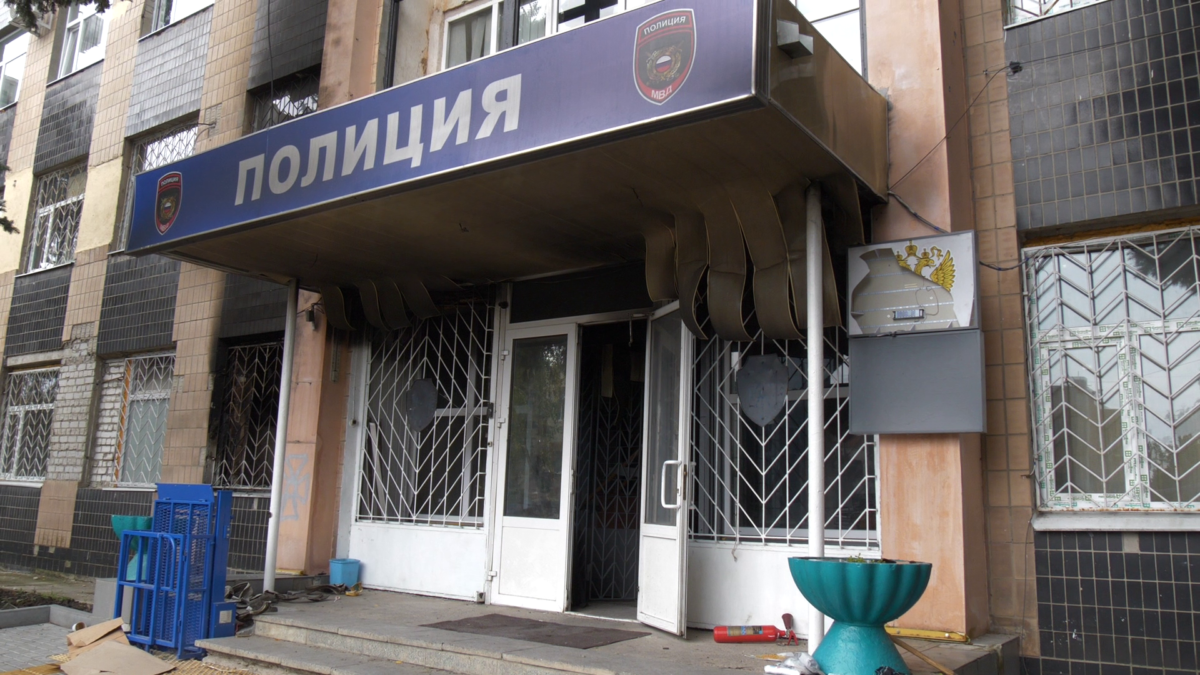
— They took my shoelaces, my keys, my money and, worst of all, my glasses. And my eyesight is minus ten. They put me in what they call an exercise cell (a large cell without a roof). So, there was no roof. Usually, prisoners are taken there for a walk. When I went in, I saw a man with a rubbish bag tied over his head. Only a small slit was left near his mouth. We asked him: “Why are you wearing that bag? Take it off!” He replied: “If I take the bag off, they will kill me”. Once the bag accidentally came off, the guard took the man out of the cell, beat him with a truncheon, put the bag back on his head and said: “If you take it off, I’ll kill you!”
I saw a man with a rubbish bag tied over his head. Once the bag accidentally came off, the guard took the man out of the cell, beat him with a truncheon, put the bag back on his head and said: “If you take it off, I’ll kill you!”
It was up to thirty degrees Celsius during the day and only six degrees at night. I was wearing a T-shirt and jeans. It was hot in the day and very cold at night. The first day was fine, but it was impossible to sleep. The concrete floor was cold. You could doze off by crouching against the wall and putting a plastic bottle between the cold wall and your back. The second night it rained. They (the Russians) threw a waterproof cloth over part of the cell from above. We spent the night hiding under the cloth.
One of the Russians threw a pile of Ukrainian military coats into the cell: “So you won’t die here!” Well, it was at least a kind of expression of humanity...
There were many curfew violators in this cell. The Russians dealt with them quickly: they beat them and then let them go. There was one man who was here for the third time. He was handcuffed for several days. In this cell there was a kind of pull-up bar. And they’d hang people on it with handcuffs. You could hang like that for a day or two. People’s hands would turn blue. That’s what the others told me. I never saw anybody hang for many days, just for a few days.
Torture with electricity for the word “war”
— They handcuffed me, put a bag over my head and took me for interrogation. I could tell from the way they led me that they were taking me to the first floor. While they were taking me, I heard “mocking”. There was a nurse, a “funny” girl. “Where are you taking this body?” she asked, laughing. Prisoners were not people to her, just “bodies”.
During the interrogation, the FSB officer began with a simple question: why does Vitalii not want to work at the school? The teacher replied that he had been working for 25 years and wanted to retire. Then the interrogation got tougher. They forced Vitalii to name the local Ukrainian soldiers, owners of assault rifles and people hostile to the Russian troops.
— I said: “I don’t know anyone. Since the war started, I’ve only been at home and in my vegetable garden. I’ve never been anywhere else”. At least I said something, because if I didn’t say anything — there were clamps on my fingers — they started to give me electric shocks. At first the shocks were painful, but bearable. But as soon as the FSB officer didn’t like something, he tortured me harder. I’d say the word “war” and he’d electrocute me and correct me: “Not a war, but a special military operation”. I had to answer something about weapons. And I remembered this “chairman” who had started to work for the Russians. And I told the officer about this bastard: “He must have a weapon, he is a rich man, he must have it for sure!"
Vitalii was asked about the local women. The officer said that they had set up a sabotage and reconnaissance group in the village. Vitalii gave the same answer to everything: “I don’t know anything”. Although in fact some of his friends had given our troops the coordi-nates of the Russian troops and military equipment.
— I was playing dumb with them. But suddenly the officer freaked out and gave me such a strong electric shock that I thought I was going to die.
The same day, Vitalii was moved to another cell. There were 13 people in a cell designed for four. But after the cell without a roof, where a bucket covered with a plastic bag was used as a toilet, it seemed almost comfortable to Vitalii.
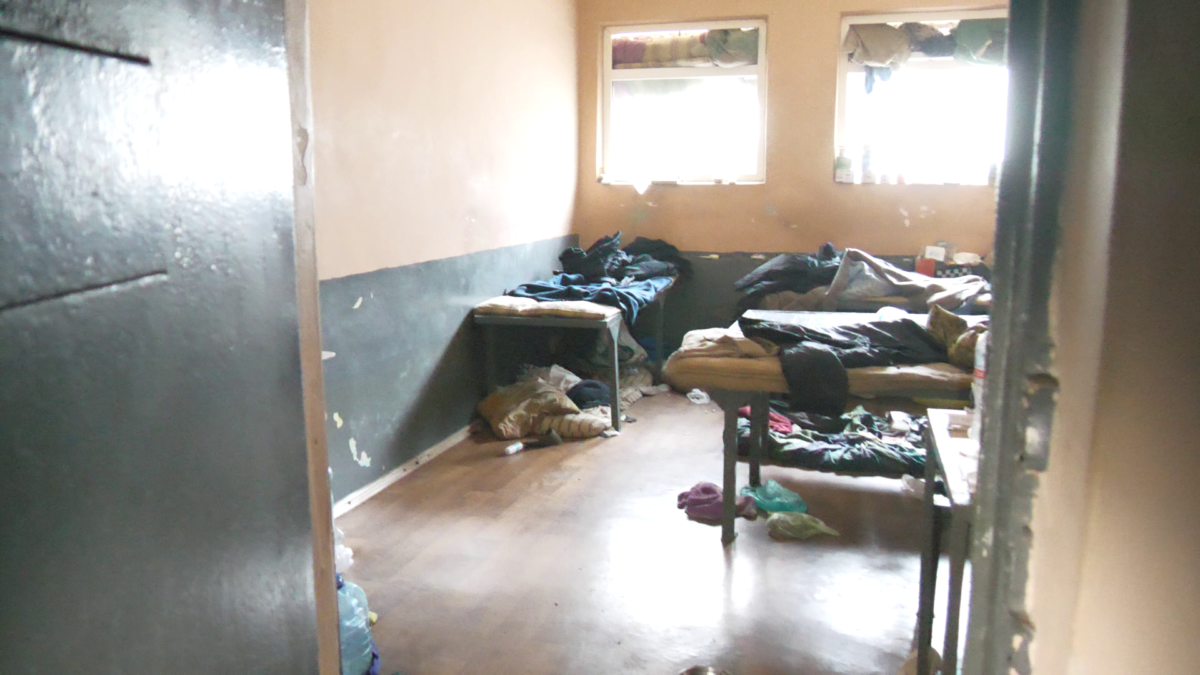
— At least there was a roof and a toilet. We slept in turns: some on bunks, some on mat-tresses under the bunks, and some on the floor between the bunks. There were different people. One man was from Kharkiv. According to him, they (the Russians) caught him because he was wearing camouflage on his identity card photo. When he got a new identity card at the age of 45, he used a photo he had once taken for a hunting licence. He was sentenced to 100 days in prison. There was a man who ran a chain of pharmacies. There was also an 18-year-old boy.
They took me back for interrogation. They tortured me again with electric shocks. They said: “Tomorrow you will come with us to the school archives to look for the school records”. I said: “There has been a new school administration for a month. Maybe they’ve moved everything around and we won’t find anything”. They answered: “If you don’t want to cooperate, then remember that we know you have a family. Your wife will be in a cell next door and your son will be in a Russian penal colony”. I asked: “On what grounds will you take my son?” “Do you think we will not find drugs in your house?” After that I was silent. It was a terrible night. I lay there thinking: “Now they will start terrorising my wife and my child and planting drugs in my house. I wish they’d (family) leave the village!” We agreed in advance that if the Russian troops captured me, my wife and son would leave immediately.
“We set fire to everything the FSB had on us”
— The night passed, and all day long no one interrogated me. There was a hole in the door through which food was passed, they called it the “feeder”. When the feeder was closed, there was no air in the cell. Usually, the Russians would close it to punish us. Suddenly we heard everybody running somewhere. Then some of the soldiers closed the feeders in all the cells. And then the guard came and locked all the feeders with a key.
Explosions started. In the cell next to us people started banging on the door. No one answered. They started banging harder. We heard the “feeders” being broken out. The guards didn’t react. And the explosions were already somewhere nearby. We heard that people in the cell next to us tried to pull out a plastic window. They pulled out the glass unit. But there was also a bar. It was impossible to break it, it was fixed in eight places. We heard the bars shaking. The bunks in the cells were welded to the floor. It sounded as if the bunks were torn off and the bars were being knocked out by the bunks. It was impossible to break the door from inside, so it was easier to try to break the bars. And at the same time we thought: “The guards will come soon and kill all of us”.
In the cell next door, the prisoners broke out some of the bars. The skinniest of them got out, and then other people got out after him. They found a window without bars, broke the glass, got into the guardhouse and found the keys to the cells. We heard that they were trying to open our cell. And eventually all the cells were opened.
While hiding from the shelling, the Russian troops trapped 150 people. Fortunately, they all managed to escape. But little did they know that a Ukrainian counteroffensive had begun. It seemed that as soon as the shelling stopped, the Russian troops would return to the temporary detention centre. And those who escaped without identity cards would be detained at the first checkpoint.
![Віталій Чернов розповідає про масову втечу в’язнів з катівні у Куп’янську © Оксана Комарова [Куп’янськ катівня ІВС] Vitalii Chernov reports about the mass escape of prisoners from the detention centre in Kupiansk © Oksana Komarova Виталий Чернов рассказывает о массовом побеге заключенных из застенок в Купянске © Оксана Комарова](https://khpg.org/files/img/1608814879.jpg)
— We kicked in the door to the evidence room. All our stuff was in bags in there. I finally got my glasses. But there were no ID cards. We kicked in the door to the police station. We found the passport office. But even there we couldn’t find our IDs. We went to the first floor, where the interrogations took place.
We kicked in the door to the investigator’s office. Keys were sticking out of the safe. There were some documents and smartphones. But mine was gone.
Then we went through the documents: there were records of Ukrainian soldiers, their personal details and addresses. We piled them all on the table and set them on fire in the investigator’s office. And we did the same in all the offices. We took our smartphones. And then we set fire to all the documents we found — everything the FSB had on us.
Someone set fire to the archives downstairs. We set fire to the book of arrests. Why did we do that? So that if the Russians came back, God forbid, they couldn’t use those records to bring everyone back. So, the building was on fire, it was full of smoke. I ran to my cell to find something to wear, because I was only in a T-shirt. Suddenly, I saw a guy handcuffed to the door in the exercise cell. We tried to free him, but we had no keys for the handcuffs. We looked for some paper clips in order to open the handcuffs, someone even found a drill. Somehow, we got him out.
“I could recognise people from the detention centre even in a crowd”
We left the detention centre. We were free. I thought: there was only one checkpoint nearby, another one a bit further away, and I had no ID. Where should I go? A few guys and I sat down on the ground and started to think. The morning dawned. A Russian policeman passed by. He saw the building burning and said: “Oh, there should have been shelling here?” I replied: “I don’t know, maybe...” “Why are you sitting here?” “We don’t have any IDs!” “It’s all right, tell the officers at the checkpoint that I let you through!”
Eventually, Vitalii decided to try to make his way home. On the way he met another man who had escaped from the detention centre. He was from Kupiansk. Not only he, but also his wife had been imprisoned.
— It was a terrible story. A woman was taking out the rubbish. There was a column of Russian vehicles driving down the street. She threw the rubbish out, went back and then a jeep stopped in front of her: “You are disturbing a military operation”. They started to beat her and she screamed. Her husband jumped out of the house shouting: “What are you doing? Why are you doing this to her?” He started to defend her, so the Russians got them both. Their teenage daughter was left home alone.
These spouses drove Vitalii out of Kupiansk in their car.
— As we drove, we saw the abandoned Russian military equipment. Some checkpoints have been destroyed. We saw two guys walking near Spodobivka (a village in Kharkiv Region). I understood that they were from the detention centre. That day I could recognise anyone from the detention centre even in a crowd: they had a completely different look, a dead state. They stopped. They were going to Shevchenkove, they had already walked 17 kilometres. We took them with us.
I was dropped off near my village, and the guys were taken further on, to Shevchenkove. I walked a few metres along the road and a military officer came out of nowhere. I thought: “Well, that’s it... They will catch me again, and this time they will take me straight to Belhorod (a town in Russia)”. And then I looked at the soldier’s hand and I saw a blue armband. He was from the Armed Forces of Ukraine! Our soldiers! He took me to the commander; I told him where I was from and who I was. The commander asked me where the enemy’s equipment was.
Vitalii told the AFU everything he had seen in Kupiansk: the location of Russian checkpoints, tanks and armoured personnel carriers. “And then the Kupiansk spouses, who were just returning home from Shevchenkove on the same road, told the Ukrainian soldiers about all the shortcuts they could take to avoid enemy checkpoints. The Ukrainian flag flew over the Kupiansk village council on 10 September 2022.
When our hero finally returned home, it turned out that his family had long since left the occupied territory. Now the family is reunited. Borivske is recovering from the occupation.
Translation: International Society for Human Rights (German Section)
